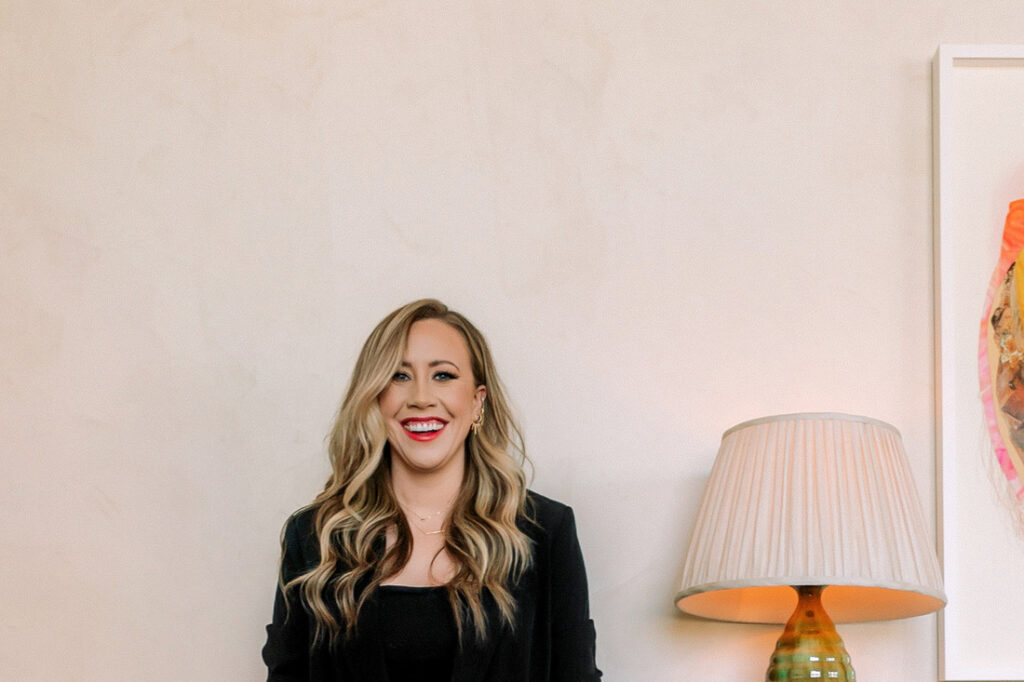Chicago-based entrepreneur, author and podcast host Kate Kennedy did not set out to become an internet sensation, but when an Australian radio station shared her “turn off your straightener” doormat on their social media a decade ago, the post went viral. “I was in a very Pinterest-forward era where I wanted cute home decor,” Kennedy reflects. “I didn’t want a paper sign on my door, so I built it into another household item…. Doormats welcome you in your home, and I wanted to make one to see you on your way out.”
Viral opportunity knocked and Kennedy’s marketing expertise answered, reverse engineering the business of product development to fill the demand. She called her new business Be There in Five because she figured that the people who wanted a reminder to turn off their curling iron were the same people texting their friends “be there in five” minutes when they hadn’t even left their house.
Kennedy realized she wanted to pivot the creative direction of Be There in Five to connect more deeply with her audience and take charge of her new solopreneur career. “I pivoted into a podcast once I realized the reality of entrepreneurship and the difficulty of having a product-run business, which not everybody was talking about in the ‘girl-boss-hustle-grind-start-a-business-monetize-your-hobby’ era,” Kennedy says.
A Pop Culture Podcast Built on Connection
Her market research background informed the launch of her podcast Be There in Five after noticing a gap in the podcasting landscape for solo female hosts who engage in long-form, broad discussions without a defined niche. Drawing inspiration from her love of popular culture and nostalgia, Be There in Five celebrates the multifaceted interests of millennial women, rejecting societal pressures to speak less and niche down. In her weekly podcast, Kennedy speaks to her audience like a friend having an intimate, lighthearted conversation about any and everything, talking in-depth on subjects often dismissed.
“I’m really proud of carving out a space for these aspects of girlhood, or of womanhood, where we feel misunderstood, misrepresented or underrepresented and breathing life into them on the podcast,” she shares.
These days, Kennedy is a well-known name in the millennial zeitgeist, and the community around Be There in Five has become a global empire of best friends.

Fostering an Online Community
After receiving countless direct messages from listeners addressing her as “Beth” and expressing their appreciation for her work, Kennedy embraced the mix-up, which ultimately led to the formation of an official online community. “The Beths are the best!” Kennedy says. “It’s an affectionate term for my audience because my handle used to be @bethereinfive, which looks like the name Beth Erin Five.” Kennedy expanded her creative process into a collaboration with her audience, reflecting their diverse experiences in her content.
During the pandemic lockdown, she got to know her community by hosting “PowerPoint Nights” through Patreon, where listeners shared 15-minute presentations on topics they were passionate about, essentially hosting their own mini podcasts for the community.
Transforming Podcast Topics Into a Bestselling Book
Kennedy says that her book, One in a Millennial, is the culmination of everything discussed in The Beths online community over the past six years. It’s a playful, reflective memoir that creatively tells universal experiences through personal stories. The tone is nostalgia tempered with whip-smart reverence for the small details of coming of age in the era of AOL Instant Messenger, Saved By The Bell, American Girl dolls, summer camp and more. Kennedy’s poetic prose elevates small details of life to important cultural milestones that make up a shared experience, the collected folklore of the overlooked zeitgeist of millennial youth.
What was once laughed off as girlish, and therefore unimportant, is transformed into immersive cultural reflections explaining the politics of ’90s sleepover culture and the details of suburban pagan seances performed in someone’s attic. She details a shared language of pop culture separate from celebrity or entertainment news. “I think that I’ve achieved success by finding the ways people want to be seen and kind of uncovering them and making them public,” Kennedy says.
Kennedy, who found out the book landed on The New York Times bestseller list while she was washing baby bottles, says people often assume life looks different once you’ve achieved “certain guardrails. But for me, I feel the exact same.
“I took a break—and went back and finished. Like, what am I supposed to do? Spray champagne on my 6-month-old?” she says. “These achievements are important, but they’re not everything,” Kennedy says.
Social Media: A Sensitive Person’s Guide to Success
Over the past decade, Kennedy’s fame has continued to rise without skyrocketing into “can’t-be-in-public” celebrity, but with increased fame comes internet commentary. “Sensitive people are needed online, but they need to create systems that protect them from feeling drained by negativity,” Kennedy says. She suggests the following tips for healthy social media and audience engagement.
- Set Boundaries: Develop boundaries for when and what you engage with to protect your energy. Turn off push notifications, avoid negative input before bed and be mindful of who you interact with.
- Know Your Target Market: People often get talked out of their business ideas when they rely on feedback from nontarget audiences like close family and friends, whose opinions feel important but can lead to poor decisions.
- Create Content You’re Passionate About: Finding your audience takes time, so it’s important to create content you’re proud of and consistent with, even without an audience.
- Don’t Throw Away Your Shot: If you’re lucky enough to go viral, create an email list, start a newsletter, launch a podcast—whatever allows you to collect your audiences’ user information and stay connected is the key to success.
- Value Your Audience: Focus on and reward your engaged customers who support your work and repeatedly come back instead of constantly seeking new audience members.
- Foster Positive Community: Taking your audience seriously from the beginning, engaging with them directly and using platforms like Patreon to build a positive, supportive community allows you to foster deeper connections and filter out spicy comments and negative hot takes from trolls.
This interview appears in the November/December 2024 issue of SUCCESS Magazine. Photo of Kate Kennedy courtesy of aesthetiica









